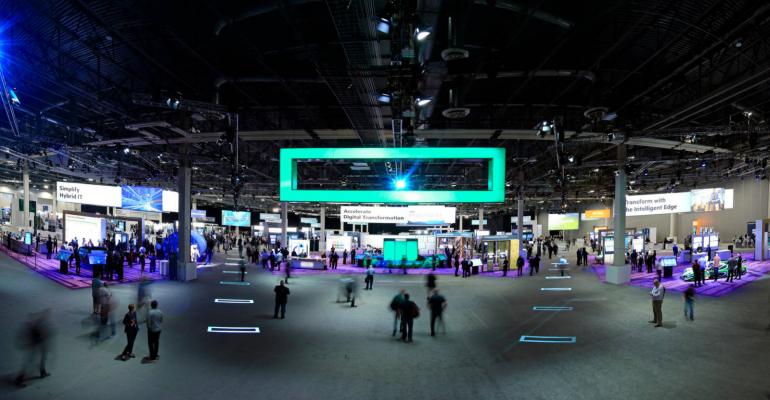Hewlett Packard Enterprise executives kicked off the company’s virtual 2020 conference Tuesday by painting the current public cloud services as outmoded and inefficient – in the age of edge computing – and rolled out a new brand: Ezmeral.
It’s a kind of instant hybrid cloud platform, to be offered to enterprise customers in “building blocks,” giving them a single cloud that incorporates on-premises and colocated servers they already own, plus HPE servers built for colocation and the edge.
It would all be deployable in the field, in one or more customer facilities worldwide, within what HPE promises to be no longer than a two-week timeframe. And it would all be payable on an as-you-go basis.
Ezmeral is HPE’s answer to Tanzu, the enterprise Kubernetes platform built by Dell Technologies-controlled VMware, and to OpenShift, the enterprise Kubernetes platform built by now IBM-owned Red Hat.
“Without question, I think Tanzu and OpenShift are the two swim lanes, and Ezmeral will be a third swim lane,” Kumar Sreekanti, HPE’s CTO and Head of Software, said during a conference call with press and analysts this week. A “swim lane,” in marketing lingo, is a metaphor for a product that may not have been intentionally engineered to compete with other products but ends up doing so anyway.
Sreekanti and his colleagues painted a picture of a workload deployment system that can be deployed anywhere a customer has computing assets and even in places where they may not have assets yet. That includes micro data centers, campus facilities, and colocation data centers where new HPE servers may be professionally installed.
A String of Acquisitions
Some of our readers may remember Sreekanti as the VMware veteran who founded machine learning platform maker BlueData. He ended up at HPE by way of HPE’s acquisition of BlueData in 2018. Now, he’s overseeing integration of BlueData into HPE’s emerging platform as Ezmeral ML Ops. He’s also marshaling the transition of MapR’s patented “data fabric,” as part of a 2019 acquisition.
During the press event, Sreekanti told us that highly deterministic (time-dependent) and high-performance AI workloads are not being implemented for Ezmeral just yet — that these were two “swim lanes” that could for now be considered orthogonal. But performance options that do compete against HPC are “a roadmap item” that may yet be implemented, particularly in conjunction with another brand HPE acquired last year: Cray.
HPE's Branded Kubernetes
In what may be a confusing mix of acquired and homegrown brands mid-transition, the Ezmeral workload deployment platform for now will be made available to HPE customers by way of its cloud platform GreenLake, which the company originally introduced in December 2019 as a kind of multicloud evaluation system for prospective enterprise customers. Now GreenLake appears to be launched all over again as a full-scale cloud services market that in one respect will compete against Microsoft and Amazon, yet in another include Azure and AWS as its deployable services.
“We use foundational components and building blocks that are purposely engineered and optimized for our GreenLake customers,” explained Keith White, HPE’s senior VP and general manager for GreenLake Cloud Services, “and we’re bringing a whole new level of automation and simplicity.”
“We offer 17 new pre-integrated configurations available from the factory direct for HPE GreenLake Services,” said White. Customers may choose from configurations presented as “small,” “medium,” and “large” sizes. Installation and network connections may then be made either by an HPE channel partner or by a PointNext services associate.
To accommodate this new option, White went on, the GreenLake portal will be expanded to include some of the public cloud’s long-time core services: self-service virtual machines and containers. “This provides a unified platform for cloud-native and non-cloud-native applications, provides persistent storage for stateful apps, and added enterprise-grade security and control,” he said.
Ezmeral, then, comes to represent the portfolio of cloud-native, container-based services for managing and deploying container-based workloads — effectively, HPE’s branded Kubernetes. As John Schultz, who heads HPE’s Transformation Office, explained to analysts, his team believed it necessary for GreenLake to offer a single cloud, as opposed to a multi-cloud, as a way of unifying the “customer experience.”
“The key here is, while transactional work continues to be an important part of our business, and we’re going to continue to sell a lot of hardware into the future,” remarked Schultz, “we need to change that customer experience using that cloud platform that runs across all of our cloud services, and really enables a different level of experience, but also a different level of engagement in terms of real customer solutions.”
Put another way, it’s nice to have a system to give customers choice, and it’s even nicer to support it with a platform that defines what that choice is. Such a choice definition system could effectively steer customers towards the future deployment system that’s the easiest to manage, with the most attractive margins. It’s beginning to look even more like Kubernetes.
Kubernetes On Bare Metal
“Today, when customers ask for servers, what they get is virtual machines,” noted Sreekanti. “As people become more comfortable running containers in a more secure fashion on bare metal, there’s no reason for a double interaction, meaning double abstraction or double virtualization.” He cited one financial institution that as an early HPE platform customer found itself transitioned to running Kubernetes-orchestrated containers with machine learning workloads on bare metal.
“I would say, people are getting warmed up,” Sreekanti added.
HPE is now taking the first steps in making Ezmeral generally available. It also has re-dubbed its existing HPE Container Platform as HPE Ezmeral Container Platform and is offering it to applicant beta customers for testing through GreenLake, with the intent of releasing it generally in Q4.





